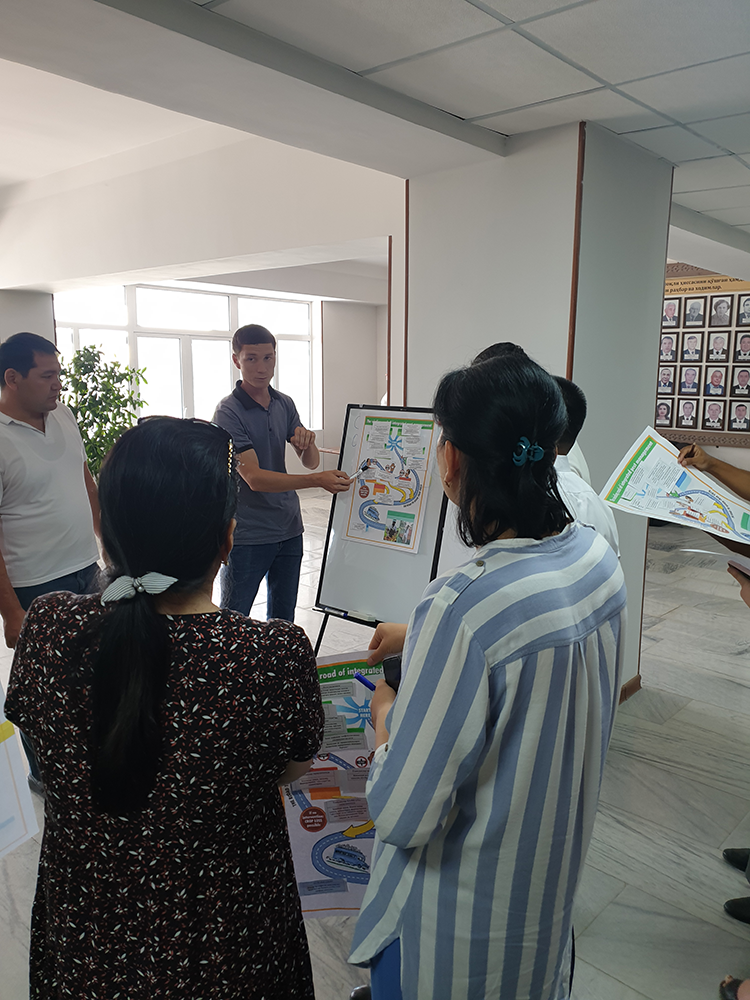
In Uzbekistan, harmful agrochemicals heavily used during the vast cotton production programme during the Soviet era continue to negatively impact the environment, agriculture and human health. This has also had ripple effects on international trade. Some exports have been rejected by the EU for having excessive pesticide residues, with the costs of destruction within the EU or return to supplier both being borne by the exporter. Accordingly, the country is keen to advance more environmentally friendly and sustainable approaches to crop protection.
Challenges arising from the use of harmful agrochemicals have led to reluctance among growers to export to lucrative EU/UK markets. Instead, they opt to export to countries in central Asia and the Far East where import requirements are not as stringent. The thorny problem of double standards on safety for produce exported and produce sold on the domestic market is a challenge for many countries, including Uzbekistan. As part of an EU-funded project, NRI experts have been supporting farmers in Uzbekistan to tackle agricultural pest problems in ways that minimise risks to people, the environment and international trade.
In April 2022, Prof. Richard Hopkins, Head of NRI's Agriculture, Health, and Environment Department, along with Prof. Hans Dobson, an expert in Integrated Pest Management (IPM), trained Uzbek farmers in Tashkent on Integrated Pest Management. The NRI team was accompanied by two experts from the Centre for Agriculture and Bioscience International (CABI) who brought valuable expertise in biocontrol and access to their extensive information resources. IPM involves the sustainable management of pests using a combination of cultural, biological and chemical techniques and Uzbek farmers and officials are keen to adopt this approach. They also want to diversify their cropping, with less focus on cotton and wheat production, hence the need to develop IPM strategies for an ever-increasing range of crops.
NRI’s philosophy on pesticides is to use them, ‘as little as possible but as much as necessary’ to manage the pests, and in ways that do not disrupt natural pest-regulatory processes in the cropping ecosystem. Some Uzbek farmers reported that they were already practising IPM and had been for years. The impression, however, was that it is currently a very stop-start, pesticide-intensive approach, with short lulls in the calendar spraying programme to release Biological Control Agents (BCAs). BCA is the overall term used for arthropod predators such as ladybirds that eat other insect pests, or parasitoid wasps, which develop inside pests and kill them. This approach to pesticide application was contrary to NRI’s approach, which is to monitor the crop and then make informed decisions on interventions.
Uzbekistan’s BCA programme is advancing and flourishing. There are approximately 600 BCA production labs (90% private entities) around the country producing parasitoids and predators native to Uzbekistan for distribution to farmers. However, a proper and complementary integration of the BCA program with responsible pesticide use is key for sustainability.
In addition, pesticide choice is important. Some have much less impact on the environment and natural pest predators than others and don’t persist as long on crops. This gives the cropping ecosystem time for recovery and minimises pesticide residues on crops. The conditions for widespread IPM adoption would be more favourable if many of the older, more persistent pesticides were de-registered for legal sale and use.
A second visit to Tashkent in August 2022 was made to run a formal ‘Training of Trainers’ course on IPM. This was about achieving an equal balance between technical content and training skills, materials and approaches to make lasting behaviour change among farmers more likely. The technical content included pest/natural enemy identification and calibration of sprayers to achieve the correct dose.

A training aid was used as a conceptual framework to cover the main elements of IPM. It comprised a poster depicting the ‘winding road’ travelling from field preparation to harvest. Participants had to put 13 captions at appropriate locations on the journey and justify their positions. Farmers and agricultural staff requested definitive answers and clear instructions. Rather than providing a simple ‘right answer’, the NRI approach was to provide the framework which allowed them to develop their own IPM protocols for specific crops during and after the course. Group work and presentation to other groups stimulated considerable constructive discussion.
NRI continued to provide mentoring to the IPM trainers until the end of the year as they rolled out country-wide trainings. A five-year EU project proposal is being prepared to build on these efforts. The project will focus on institutional capacities to ensure compliance with international standards for food safety, pesticide use and sanitary and phytosanitary regulatory measures. It will also enhance the capacities of smallholder farmer organisations to advocate for family farming and strengthen their competitiveness and market inclusion with an emphasis on women’s empowerment. It will further aim to facilitate agribusiness incubation for women, the youth and other vulnerable groups.
NRI's initiatives in Uzbekistan are establishing a strong basis for the integration of BCAs and responsible pesticide practices which will ultimately advance more sustainable agriculture and boost international trade in agricultural products.

